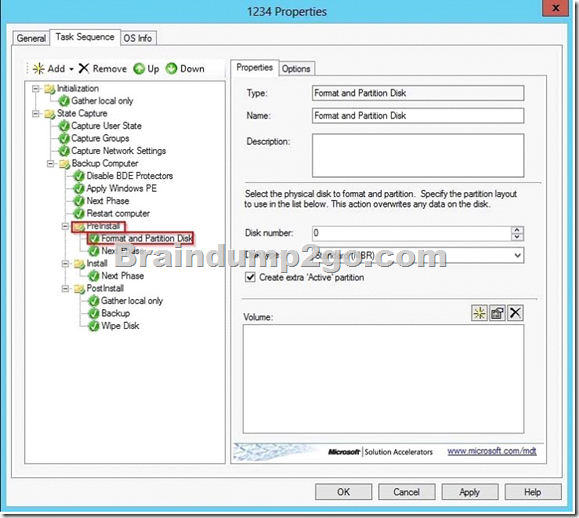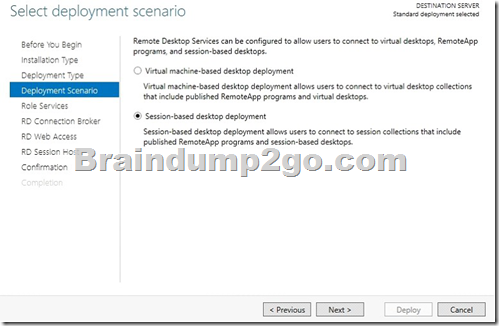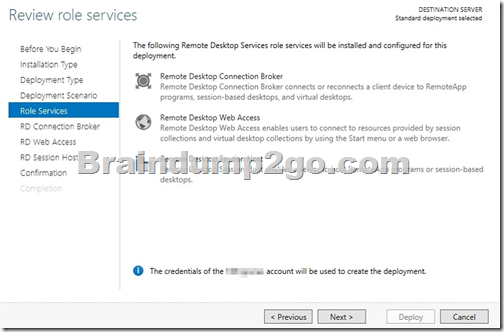Microsoft 70-415 Certification New Released Sample Questions Free Download from Braindump2go (41-50)
Braindump2go Updates Microsoft 70-415 Exam Dumps Questions, adds some new changed questions from Microsoft Official Exam Center. Want to know 2015 70-415 Exam test points? Download the following free Braindump2go Latest Exam Questions Today! Vendor: Microsoft
Exam Code: 70-415
Exam Name: Implementing a Desktop Infrastructure 
Case Study 1: Proseware Inc (Question 41 – Question 50)
Overview
Proseware, Inc. is an independent software vendor.
The company has a main office and two branch offices.
The main office is located in New York.
The branch offices are located in London and Moscow.
Existing Environment
The New York office and the London office each contain the following servers that run Windows Server 2008 R2:
- One Windows Deployment Services (WDS) server
- One Remote Desktop Session Host (RD Session Host) server
Each office contains client computers that run Windows XP. The London office and the New York office connect to each other by using a high-speed WAN link.
The Moscow office and the New York office connect to each other by using a low- speed# high-latency WAN link.
The network connection between the Moscow office and the New York office frequently fails.
Requirements
Planned Changes
The company plans to implement the following changes:
- Migrate all of the client computers to Windows 8.
- Deploy new applications named App1, App2, and App3.
- Deploy a Virtual Desktop Infrastructure (VDI) in the New York office.
- Deploy a Windows Server Update Services (WSUS) infrastructure.
Migration Requirements
The company identifies the following migration requirements:
- Migrate the client computers to Windows 8 by using the Microsoft Deployment Toolkit (MDT).
- Replace the client computers in the New York office. Migrate the user settings during the migration to the new hardware.
- Ensure that the client computers in the London office that are not PXE-capable can download images from WDS.
- Reformat the existing disks in the London office during the migration to Windows 8.
- Avoid using the WAN link between the Moscow and New York offices whenever possible.
- Avoid deploying any servers to the Moscow office.
Virtual Desktop Infrastructure (VDI) Requirements
The company identifies the following VDI requirements:
- Automatically provision new virtual desktops based on a virtual desktop template.
The new virtual desktops will run Windows 8.
- Automatically discard any user changes to the new virtual desktops when the users log off.
- Deploy a 3D graphics application named App1 to all of the new virtual desktops.
App1 will require DirectX 11 support.
- Ensure that updates for App1 are applied to all of the new virtual desktops.
Application Requirements
The company identifies the following application requirements:
- In the New York office, deploy an application named App2 to the client computers that run Windows 8.
- Minimize the amount of resources used by App2 on the client computers.
- In the London office, publish an application named App3 to the Work Resources (RADC) area of the Windows 8 Apps screen.
Security Requirements
The company identifies the following security requirements:
- Ensure that updates for the New York, London, and Moscow offices can be approved only by the administrators in the New York office.
- Ensure that the users in the New York office can use only classes of USB devices that are approved by the IT department.
- Configure the replication of updates between the update servers in the New York and London offices. QUESTION 41
You need to recommend a virtual desktop solution that meets the VDI requirements.
What should you recommend? A. Managed personal virtual desktop collections
B. Unmanaged personal virtual desktop collections
C. Managed pooled virtual desktop collections
D. Unmanaged pooled virtual desktop collections Answer: C
Explanation:
Virtual Desktop Collection
There are two types of virtual desktop collections available: personal and pooled. You have the option to let Remote Desktop Services automatically manage pooled virtual desktops in a collection, or you can manually manage them. We will concentrate on automatically managed pooled virtual desktop collections.
A managed pooled virtual desktop collection offers the following capabilities:
Automatically create pooled virtual desktops based on a virtual desktop template.
Automatically install security updates and applications based on a virtual desktop template.
Live migration with local caching.
User profile disk support. A user profile disk stores user profile information in a separate virtual hard disk so that user profile settings are persistent across pooled virtual desktops. With either managed or unmanaged, the administrator can configure the pool to store the user profiles on User Profile disks separate from the machines. http://blogs.technet.com/b/canitpro/archive/2013/04/25/step-by-step-deploying-virtual-desktops-with-windowsserver-2012.aspx
Virtual Machine-based desktop Deployment is of two types:
Personal Virtual Desktop Collection-Administrators manually assign virtual desktops to the users.
Pooled Virtual Desktop Collection-Administrators deploy virtual desktops and users are randomly assigned virtual desktops. At log off virtual desktops are generally rolled back (rollback is optional).
Creating a Pooled Virtual Desktop Collection
There are two types of Pooled Virtual desktop Collections:
Pooled Managed The Virtual desktop machine is created using the Sysprep Template of a virtual machine.
We can recreate the virtual desktops from this image at will.
Pooled Unmanaged We can add the existing virtual machine to this virtual desktop collection from Hyper V pool.
With either option, the administrator can configure the pool to store the user profiles on User Profile disks separate from the machines.
http://blogs.technet.com/b/askperf/archive/2012/10/31/windows-8-windows-server-2012-pooled-virtualdesktop-infrastructure.aspx 
http://technet.microsoft.com/en-us/library/ee216741.aspx QUESTION 42
You need to configure a Deployment Workbench task sequence that meets the migration requirements of the London office.
Which task group should you edit? A. Preinstall
B. State Restore
C. Postinstall
D. Capture the reference machine Answer: A
Explanation: 
QUESTION 43
A hardware supplier provides you with four server builds.
The server builds are configured as shown in the following table.
You need to recommend which server build must be used to meet the VDI requirements.
What should you include in the recommendation?

A. Build1
B. Build2
C. Build3
D. Build4
Answer: C QUESTION 44
You need to recommend a solution for updating App1.
The solution must meet the VDI requirements.
What should you recommend? A. Create a new virtual machine from the template file, apply the patch, and create a snapshot
of the virtual machine.
B. Create a new virtual machine from the template file, apply the patch, and run sysprep.exe.
C. Mount the virtual machine template on a physical host and configure the template to be
bootable. Apply the patch and run sysprep.exe.
D. Mount the virtual machine template on a physical host and configure the template to be
bootable. Apply the patch and run dism.exe. Answer: B
Explanation:
Ensure that updates for App1 are applied to all of the new virtual desktops.
Rolling Out Updates to a Pooled Virtual Desktop Collection
A Master or Gold VM is formally referred to as "virtual desktop template" in the WS2012 Server Manager UI console and the cmdlets in Remote Desktop Services module for Windows PowerShell. It is an input to the managed virtual desktop collection creation process that allows an admin to manage a virtual desktop collection. The Master VM is created and managed by the admin and it specifies the hardware properties and software contents of all the automatically created VMs in that managed virtual desktop collection. For example, if the master VM is assigned 2GB of RAM, then each of the automatically created VMs in the managed virtual
desktop collection will be assigned 2GB RAM. In this section, I will describe the various supported options and requirements for the Master VM.
Virtual Hard Disk
The Master VM can only have one virtual hard disk (VHD) attached to it; more than one VHD attached to the Master VM is not supported.
The VHD attached to the Master VM must have either a Windows 7 SP1 or Windows 8 image in sysprep generalized state.
A diff disk chain attached to the Master VM as its VHD is supported.
Although the VHD can have more than one logical partition defined in it, it can have only one Windows OS image installed in it.
http://blogs.msdn.com/b/rds/archive/2012/10/29/single-image-management-for-virtual-desktop-collections-inwindows-server-2012.aspx QUESTION 45
You need to prepare a virtual machine template that meets the VDI requirements.
What should you do? A. Run dism.exe and specify the /image parameter.
B. Run dism.exe and specify the /export-image parameter.
C. Run sysprep.exe and specify the /audit parameter.
D. Run sysprep.exe and specify the /generalize parameter. Answer: D
Explanation: 
QUESTION 46
You need to deploy Windows 8 to the client computers in the Moscow office.
The solution must meet the migration requirements.
What should you do first?
A. From the Windows Deployment Services console, add a boot image.
B. From the Windows Deployment Services console, add an install image.
C. From the Deployment Workbench, select New Media.
D. From the Deployment Workbench, select New Linked Deployment Share Answer: C
Explanation:
The assumption is we only want to use the WAN link when absolutely required.
If we create a Linked Deployment Share, all selected data would be replicated to Moscow from New York.
By managing the Task Sequence/Share locally in Moscow with no link to New York, you're only downloading the media and software one time.
Solution: Use MDT to create a bootable image for a DVD or external drive.
Step 1: Create selection profiles.
Step 2: Create your media.
Step 3: Update your media.
Step 4: Prepare your media.
Step 5: Use your media on the client machine.
Optional: Customize or automate your media. QUESTION 47
You are planning the deployment of Remote Desktop Services (RDS) to support App3.
The RDS servers will run Windows Server 2012.
You need to recommend which RDS role services are required to ensure that App3 meets the application requirements.
Which RDS role services should you recommend? (Each correct answer presents part of the solution. Choose all that apply.) A. Remote Desktop Connection Broker
B. Remote Desktop Gateway
C. Remote Desktop Virtualization Host
D. Remote Desktop Web Access
E. Remote Desktop Session Host Answer: ADE
Explanation:
App3 is a published program. 

QUESTION 48
You need to recommend an application deployment method for App2 that meets the application requirements.
Which method should you recommend? A. Group Policy software installation
B. A RemoteApp program
C. A Microsoft Application Virtualization (App-V) package
D. A Client Hyper-V virtual machine Answer: B
Explanation:
App-V maintains local resources on the client whereas RemoteApp utilizes resources on the backend RDS Server.
The network data sent to the client is also different, App-V has two feature packs that contain all binaries of the streamed app. Remote Apps utilizes RDP, so only the picture information, mouse, keyboard etc are transmitted.
Actually they can be combined, applications can be streamed to a RDS server and published to the client via RemoteApp. For more information, please see http://blogs.msdn.com/b/rds/archive/2009/10/14/whitepaperrelease-application-virtualization-4-5-for-terminal-services.aspx
For more information about App-V, I suggest that you post to the App-V forum:
http://social.technet.microsoft.com/Forums/en-US/category/appvirtualization
Hope the information is helpful for your work. QUESTION 49
You need to configure a Group Policy object (GPO) that meets the security requirements of the users in the New York office.
Which Group Policy settings should you configure? A. Allow installation of devices that match any of these device setup classes
Prevent installation of devices not described by other policy settings
B. All Removable Storage classes: Deny all access
Prevent installation of devices not described by other policy settings
C. Allow installation of devices that match any of these device setup classes
Prevent installation of devices using drivers that match these device setup classes
D. All Removable Storage classes: Deny all access
Prevent installation of devices using drivers that match these device setup classes Answer: A
Explanation:
You'd first allow installation of specific classes and then prevent all others.
Prevent installation of devices not described by other policy settings.
This policy setting controls the installation of devices that are not specifically described by any other policy setting. If you enable this policy setting, users cannot install or update the driver for devices unless they are described by either the Allow installation of devices that match these device IDs policy setting or the Allow installation of devices for these device classes policy setting. If you disable or do not configure this policy setting, users can install and update the driver for any device that is not described by the Prevent installation of devices that match these device IDs policy setting, the Prevent installation of devices for these device classes policy setting, or the Prevent installation of removable devices policy setting.
http://msdn.microsoft.com/en-us/library/bb530324.aspx QUESTION 50
You need to recommend a task sequence to migrate the client computers in the New York office to Windows 8.
The solution must meet the migration requirements.
Which command should you include in the recommendation? A. Migpol
B. Winrm
C. Wbadmin
D. Scanstate Answer: D
Explanation:
Replace the client computers in the New York office.
Migrate the user settings during the migration to the new hardware
Braindump2go New Released 70-415 Dumps PDF are Now For Free Download, 299 Latest Questions, Download It Right Now and Pass Your Exam 100%: 
http://www.braindump2go.com/70-415.html
|







